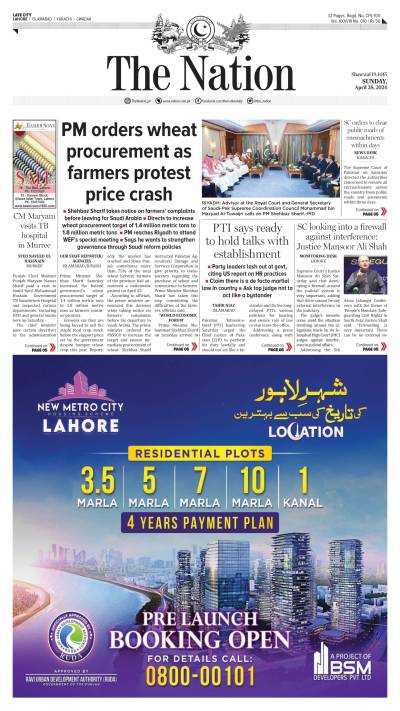LAHORE - Analysts dominantly view the newly inked agreement by three neighbouring countries of Pakistan – Iran, India, and Afghanistan – on Chahbahar deep seaport and trade route to Central Asia as Tehran’s reaction to lukewarm response from Islamabad on the offers it made on the energy and trade sectors.
While holding Gwadar far better trade and strategic route than Chahbahar, they, however, highly value friendly ties of Pakistan with Iran for which they want Islamabad to adopt independent policies to protect its own interests.
Former Army General Ziauddin Butt said Pakistan and Iran relations were not so fragile which can be affected by one move. He said though Chahbahar pact with India targets increase in trade, it was signed after Pakistan rejected different offers from Iran to facilitate it on energy and business sectors. He said Chahbahar is much inferior to Gwadar, yet the pact on it with India shows Tehran’s diminishing hopes from Pakistan. However, he said in the context of CPEC development, China would not like Pakistan and Afghanistan to stay apart. This factor and that people of the two countries, General Butt added, would also create a situation to bring the two neighbouring countries closer. He said Iran has very good and cordial sentiments for Pakistan, so Islamabad can warm its ties with Tehran anytime provided it rejects American pressure which it had accepted previously on Pak-Iran gas pipeline and others.
As to Chahbahar importance, he said Afghanistan, being a land-locked country, can have alternative trade route through it, while Iran would have an opportunity to help the Shia community of Western Afghanistan. General Butt said the net dividend of this new scenario would go to India not only in terms of boosting trade but also in improving influence in Afghanistan affairs. Pakistan can counter all that by rejecting American pressure and taking a bold stand to frame its foreign policy purely in its own interests. He said America can do nothing if Pakistan just takes a bold stand that its policies are in its own interest.
Former Foreign Secretary Shamshad Ahmad Khan says in view of Pakistan’s geo-political location, there is not much worry as long as the country is able use this situation as an asset this time. He said: “We should take policy decisions in view of our national interests. India, Afghanistan and Iran-like agreements are not new about Pakistan affairs and we can meet these challenging by framing our own policies as per our needs. Shamshad said Chahbahar port of Iran by no way can match Gwadar Port of Pakistan and we must not be worried in terms of economic benefits as far as we complete China-Pakistan Economic Corridor. Shunning dependence on others for economy and policy making and developing good governance is the right answer to the current situation and how our government performs in this regard is a test. It is such a point in our history that failure means making Pakistan subservient to the regional states,” he said.
The former foreign secretary said making the best use of geopolitical situation given the current nexus of the said three countries and to counter pressure from the US is the key option to come out of this predicament. He said the government’s failure to run institutions like PIA, Railways and Pakistan Steel Mills do convey a message about its capability of rising to the occasion.
Former Federal Minister Sardar Aseff Ahmad Ali said Chahbahar port agreement with India is, in fact, an Iranian reaction to the cold response which the Iranian President received during his visit to Pakistan when Indian agent Kalboshan episode also appeared creating his links with Tehran. He said this issue should have been highlighted some time after Rouhani’s visit to Pakistan. The Iranian president offered Pakistan Chahbahar, 5,000MW electricity and gas pipeline, but Pakistan government gave it a cold shoulder so that Iran adopted the other way, he added.
Sardar Aseff advised the government to complete CPEC which has attained extra value to counter the challenges at the regional and the international level. Gwadar is much better than Chahbahar. The former foreign minister said Taliban chief Mullah Akhtar Mansour’s killing has spoiled Pakistan’s ties with America once again. It is, therefore, need of the hour to construct an independent foreign policy to a level that no country could blame the country for harboring terrorists. These two are the best options available to Pakistan to meet the challenges of new regional political equation.
Former Ambassador Syeda Abida Hussain also mentioned the opportunities missed by Pakistan from Iran that forced Tehran to go to the other side. She said Pakistan has been excluded from the arrangement which in a way is its encirclement. India wants influence in Afghanistan and the cold response of Pakistan to the gas pipeline project spoiled its ties with Iran. She said Afghan peace is not only beneficial for Afghanistan but also for Pakistan which has a very key role to play in this regard. So no hostile foot landing on Afghan soil should be allowed, Abida concluded.





